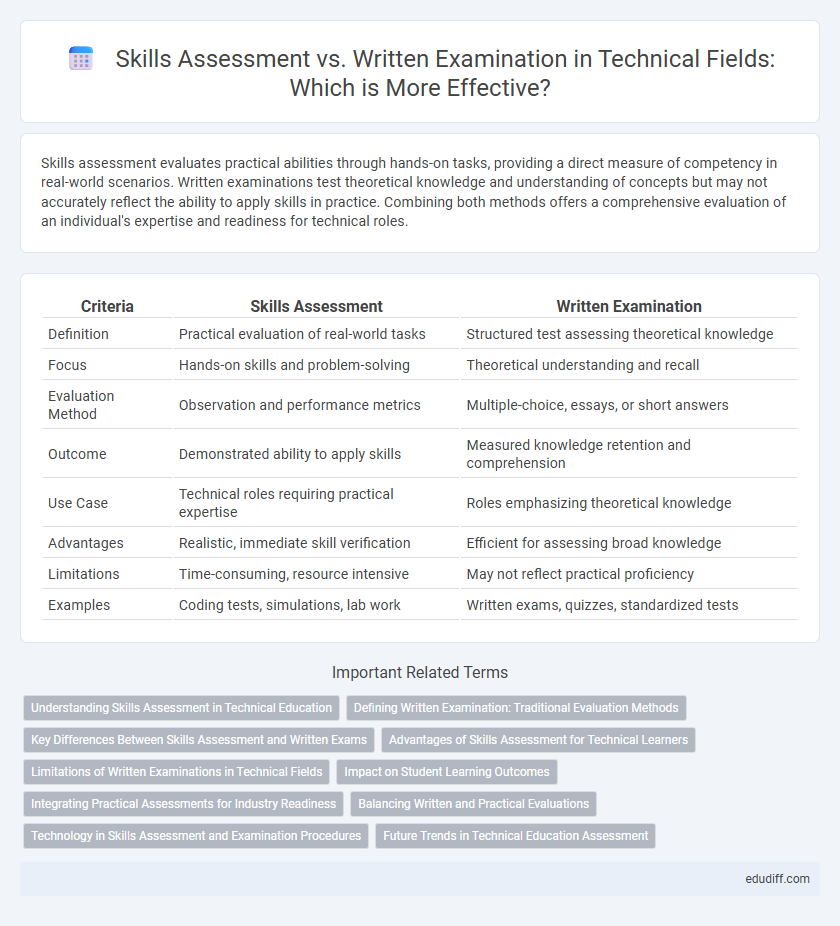Skills assessment evaluates practical abilities through hands-on tasks, providing a direct measure of competency in real-world scenarios. Written examinations test theoretical knowledge and understanding of concepts but may not accurately reflect the ability to apply skills in practice. Combining both methods offers a comprehensive evaluation of an individual's expertise and readiness for technical roles.
Table of Comparison
| Criteria | Skills Assessment | Written Examination |
|---|---|---|
| Definition | Practical evaluation of real-world tasks | Structured test assessing theoretical knowledge |
| Focus | Hands-on skills and problem-solving | Theoretical understanding and recall |
| Evaluation Method | Observation and performance metrics | Multiple-choice, essays, or short answers |
| Outcome | Demonstrated ability to apply skills | Measured knowledge retention and comprehension |
| Use Case | Technical roles requiring practical expertise | Roles emphasizing theoretical knowledge |
| Advantages | Realistic, immediate skill verification | Efficient for assessing broad knowledge |
| Limitations | Time-consuming, resource intensive | May not reflect practical proficiency |
| Examples | Coding tests, simulations, lab work | Written exams, quizzes, standardized tests |
Understanding Skills Assessment in Technical Education
Skills assessment in technical education evaluates practical competencies through hands-on tasks that mirror real-world applications, providing a more accurate measure of a learner's abilities compared to traditional written examinations. This method prioritizes the demonstration of technical proficiency, problem-solving skills, and adaptability, which are critical for workforce readiness. By emphasizing applied knowledge, skills assessments help educators identify specific strengths and gaps, enabling targeted instruction and improved vocational outcomes.
Defining Written Examination: Traditional Evaluation Methods
Written examination refers to conventional evaluation methods that assess a candidate's knowledge through structured questions, such as essays, multiple-choice, or short answers. These exams emphasize theoretical understanding, memory recall, and problem-solving abilities within a controlled, time-limited environment. Traditional written tests provide standardized metrics for comparing performance across diverse subjects and skill levels.
Key Differences Between Skills Assessment and Written Exams
Skills assessment evaluates practical abilities and real-world problem-solving through hands-on tasks, while written examinations test theoretical knowledge and conceptual understanding via structured questions. Skills assessments provide direct insight into competency and application, whereas written exams primarily measure memory recall and analytical reasoning. The choice between them depends on the objective of accurately gauging performance versus assessing knowledge retention.
Advantages of Skills Assessment for Technical Learners
Skills assessment offers technical learners practical evaluation through hands-on tasks that mirror real-world scenarios, promoting deeper understanding and retention. This method enhances problem-solving abilities by allowing learners to demonstrate proficiency in actual software, tools, or machinery relevant to their field. Compared to written examinations, skills assessments provide immediate feedback and better measure applied competencies critical for technical job performance.
Limitations of Written Examinations in Technical Fields
Written examinations in technical fields often fail to accurately measure practical competencies and real-world problem-solving abilities critical in engineering, IT, and scientific disciplines. These exams typically emphasize theoretical knowledge over hands-on skills, leading to an incomplete assessment of a candidate's true technical proficiency. Time constraints and format limitations further restrict the demonstration of complex task execution and adaptive decision-making crucial for technical roles.
Impact on Student Learning Outcomes
Skills assessments provide practical evaluation that enhances critical thinking and real-world problem-solving abilities, directly improving student learning outcomes. Written examinations primarily measure theoretical knowledge, often limiting students' ability to apply concepts in practical scenarios. Incorporating skills assessments fosters deeper understanding and retention, leading to more effective learning and better preparation for professional challenges.
Integrating Practical Assessments for Industry Readiness
Skills assessment prioritizes hands-on tasks that closely mirror real industry challenges, enhancing practical competence beyond theoretical knowledge tested in written examinations. Integrating practical assessments fosters industry readiness by developing problem-solving abilities, technical expertise, and adaptability crucial for dynamic work environments. Emphasizing simulations, project-based evaluations, and interactive labs bridges the gap between academic learning and professional skill requirements.
Balancing Written and Practical Evaluations
Balancing written examinations with skills assessments ensures a comprehensive evaluation by measuring both theoretical knowledge and practical abilities. Integrating hands-on tasks alongside standardized written tests enhances accuracy in identifying competencies critical for technical roles. This approach optimizes candidate selection by validating problem-solving skills and conceptual understanding simultaneously.
Technology in Skills Assessment and Examination Procedures
Skills assessment leverages advanced technology such as virtual simulations, AI-driven evaluations, and real-time performance tracking to provide an immersive and accurate measurement of practical abilities. Written examinations traditionally rely on static formats but are increasingly integrated with digital platforms enabling adaptive questioning and automated grading. Combining technological innovations enhances the reliability, efficiency, and scalability of both skills assessment and written examination procedures in technical education and certification.
Future Trends in Technical Education Assessment
Skills assessment increasingly integrates artificial intelligence to provide real-time feedback and adaptive challenges, enhancing personalized learning pathways. Written examinations are evolving with digital platforms that support interactive problem-solving and scenario-based questions, promoting critical thinking skills. Future trends emphasize hybrid assessment models combining practical skill demonstrations with analytical written components to better prepare students for dynamic technical careers.
Skills Assessment vs Written Examination Infographic

 edudiff.com
edudiff.com